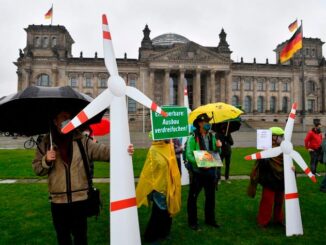
As many readers will already know, the UK is fast approaching its next general election on 4 July 2024.
This will, however, be one of the most significant general elections to date, particularly with the Labour Party expected to pounce at the opportunity to knock the Conservatives out as the governing body, a position the traditionally right-wing part has held since 2010. Equally, there are opportunities for the Liberal Democrats, Green Party and the newly formed Reform UK parties to gain seats in the Commons – and each has varying perspectives on the climate crisis.
The general election will also greatly influence the direction of the UK’s net zero journey. The next governing party is expected to stay in office for five years, securing a core term for decarbonising the British power system by 2035. Because of this, the 2024 general election has seen energy policy become a key pillar of manifestos. Many label it a “weaponisation of the energy sector, ” and parties are warring with words over implementing prospective climate strategies. Each, of course, has taken a unique route over its energy policy.
The next governing must ensure the country has the correct market credentials, a forward-thinking planning system, and that investment opportunities are ripe to achieve net zero.
The Conservatives vs Labour
The left-wing Labour and right-wing Conservative parties have traditionally been the largest political parties in the UK. Each has pledged support for attaining net zero and promoting renewable energy generation projects, but they differ in the extent of their support.
The Conservative government has widely publicised its support for oil and gas via new licenses in recent months, and climate targets have been rolled back, such as the ban on internal combustion engine (ICE) vehicles from 2030 to 2035 last year. However, it must be said that the current government has supported deploying renewable energy technologies such as offshore wind and solar.
In 2010, 653MW of offshore wind capacity came online in the UK, leading to a cumulative capacity of 5,204MW. According to recent government statistics, cumulative capacity reached 30,116MW in 2023, with over 2GW added.
In the blue corner, the Conservatives’ manifesto aims to capitalise on this, with Rishi Sunak aiming to deliver on climate without what he has called “unaffordable eco-zealotry”. While it pledges to ring-fence its commitment to International Climate Finance, the Conservative Party’s “pragmatic and proportionate” approach to the environment does not establish climate-specific spending commitments.
If re-elected, the Conservative Party has committed to tripling offshore wind capacity and ensuring democratic consent for onshore wind projects to boost renewable energy development across the UK further. The party has also promised contract payments to support offshore wind energy firms that invest in manufacturing in the most disadvantaged places in the UK.
Still, it is worth noting the inconsistencies with the Conservative government, the delays they have put in place for decarbonisation targets and the barriers preventing the scaling of onshore wind technology – something that has been heavily scrutinised in Parliament and by the energy industry. As such, many question whether the party could deliver on its current promises for net zero and turn the UK into an “energy superpower”, something its rival political party claims it could achieve.
Meanwhile, in the red corner, Labour Party’s manifesto prioritises green policies, placing them “at the heart” of its growth, prosperity, and climate resilience plans. The manifesto proposes a significant budget of £23.7 billion for green initiatives over the next parliamentary term, aiming to create 650,000 jobs by 2030, drive industrial renewal, lower bills, and ensure secure clean energy supplies.
If the Labour Party wins, it plans to create GB Energy, a publicly-owned clean power company. The organisation aims to reduce energy bills and enhance energy security. Funding for this project will come from a windfall tax on oil and gas, which directly opposes the Conservatives’ support for oil and gas licencing.
Additionally, Labour is pledging to establish a National Wealth Fund to support investment in clean energy. They aim to collaborate with the private sector to double onshore wind power, triple solar power, and quadruple offshore wind power by 2030.
Keir Starmer’s manifesto promises investment in carbon capture and storage, hydrogen, and marine energy. It also pledges to reward clean energy developers with a ‘British jobs’ bonus, allocating £500 million annually from 2026. The party aims to incentivise firms that offer good jobs and terms and conditions and build their manufacturing supply chains in industrial heartlands, coastal areas, and energy communities.
Labour’s manifesto has been scrutinised by its opposition. Secretary of State for Energy Security and Net Zero Claire Coutinho publicly expressed on social media platform X (formerly Twitter) that Labour’s climate policy “is a mess,” likening it to New Zealand’s attempts to ban new oil and gas licences—something that was later reversed.
Labour’s energy policy is a mess. Their proposal to ban new oil and gas licenses was tried in New Zealand.
They struggled to keep the lights on and have now had to reverse it.
Climate policy can’t come at the cost of our energy security or it will fail.https://t.co/DLRZi3vhji
— Claire Coutinho (@ClaireCoutinho) June 10, 2024
The Lib Dem, Green Party and Reform UK equation
Of course, the UK’s political system is not restricted to just Labour and the Conservatives. Indeed, the Liberal Democrats, the Green Party, and the newly formed Reform UK, have each grown in popularity and released their own manifestos for the general election featuring energy as a core pillar.
The Liberal Democrats’ manifesto ranks climate change as the third priority, pledging to “prioritise addressing climate change in a new industrial strategy”. This new priority would see the group target net zero by 2045 – five years earlier than the current target.
Green skills are also a core element of the Liberal Democrats’ manifesto. The group highlights the importance of equipping the next generation with green skills that will ensure employment within the renewables industry. The party pledges to invest at an educational level.
The manifesto promises to remove the barriers to new solar and wind projects and to generate 80% of Britain’s power from renewables by 2030. By that same year, the Labour manifesto pledges the party will work with the private sector to double onshore wind, triple solar power and quadruple offshore wind.
The Green Party has set ambitious goals for achieving net zero, including a target of reaching net zero by 2040. If elected, the Greens aim to increase wind’s contribution to around 70% of the UK’s electricity by 2030, develop 80GW of offshore wind, 53GW of onshore wind, and 100GW of solar power by 2035.
They also plan to invest in energy storage capacity and more efficient electricity distribution, as well as enable communities to own their own energy sources. This will allow them to use any profits from selling excess energy to reduce their bills or benefit their communities.
Green Party would also look to phase out both fossil fuels and nuclear power. Its manifesto states that it would “cancel recent fossil fuel licences such as for Rosebank and stop all new fossil fuel extraction projects in the UK”. It would also look to bring the “Big Five” energy retailers into public ownership.
The right-wing Reform UK, led by Nigel Farage, released not a manifesto but a “contract” for the 2024 general election, in which the organisation promised to “unlock Britain’s vast energy treasure of oil and gas to slash energy bills, beat the cost-of-living crisis and unleash real economic growth”.
A core pledge for the party is to scrap the UK’s net zero target, which it claims would “save the public sector over £30 billion per year for the next 25 years.” The party also pledges to fast-track North Sea gas and oil licences, grant shale gas licences on test sites for two years, and enable major production when safety is proven with local compensation schemes.
Following this, the party would fast-track “clean” nuclear energy with new small modular reactors, built in Britain, increase and incentivise ethical UK lithium mining for electric batteries, combined cycle gas turbines, clean synthetic fuel, tidal power and explore clean coal mining.
The impact of differing manifestos on the energy sector
Each political party vying for the governing body position has a different stance on net zero and plans for the energy sector. As detailed in a blog post by Andrew Henderson, director of public policy at law firm Pinsent Masons, the “energy sector will be hugely impacted by the upcoming UK general election, with organisations already working hard to establish what next month’s result will mean for them in policy terms and sector support”.
This is an important aspect of the general election and can perhaps be compared to the Review of Electricity Market Arrangements (REMA) discussions last year. With so many different avenues and policies that could be implemented/removed/changed should another political party be in charge, most companies will be overworked to ensure they are in place to continue as close to business as usual, in the likelihood any one of them is elected.
Of course, one can likely assume that the front runners, Labour and Conservatives, would be the two most popular parties, but Reform UK’s far-right approach has appealed to the public and seen a rise in support in recent weeks. Recent polls predict a higher performance in the election than the Conservatives, leading to more questions than answers in the upcoming election. What happens if the two parties merge?
The energy sector is working to ensure any surprises are planned for; thus, manpower is being directed away from concrete developments and more into strategic thinking. As such, the weaponisation of energy in each party’s manifesto and the actual difference between each could impact net zero development and even deter investment.
The general election will conclude in July, but who will be the governing body is open to speculation at the current stage, even though Labour appears to be surging ahead for an unprecedented victory. If Labour wins the election, the introduction of GB Energy could greatly impact the market’s dynamics, and the question should be when the body would be created. Alongside this, should a rise in extreme, non-net zero policies like Reform’s be a cause for concern in the energy industry?
The 2024 general election should bring several unseen twists until it reaches its climax in early July, but the biggest will be how the energy sector is perceived and where the opportunities are in what could well be a new age for energy policy in the UK.
Take the Survey at https://survey.energynewsbeat.com/
Crude Oil, LNG, Jet Fuel price quote
ENB Top News
ENB
Energy Dashboard
ENB Podcast
ENB Substack







